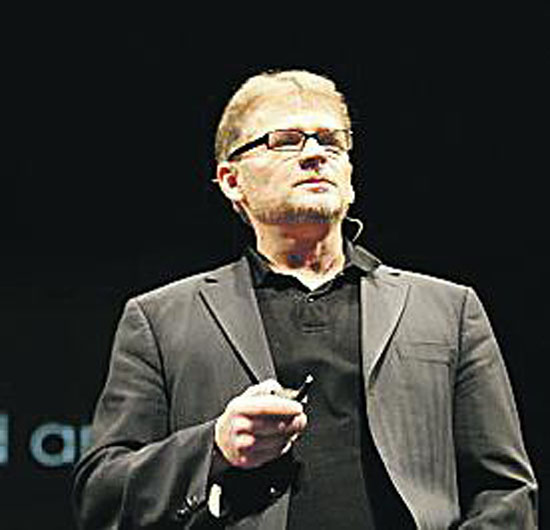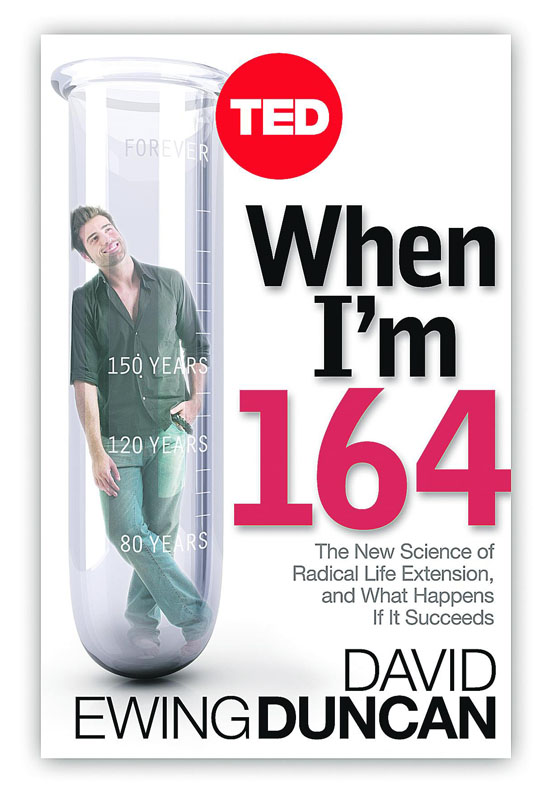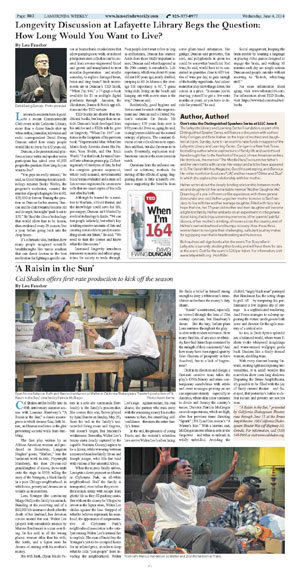|
|
Published June 4th, 2014
|
Longevity Discussion at Lafayette Library Begs the Question:
How Long Would You Want to Live?
|
|
| By Lou Fancher |
 |
| David Ewing Duncan Photo provided |
Lamorinda residents have it good. At a recent Commonwealth Club event at the Lafayette Library, more than a dozen hands shot up when author, journalist, television and radio correspondent David Ewing Duncan asked how many people would like to live to be 120 years old.
 Duncan, a frequent national-platform science writer and speaker series participant has asked over 40,000 people the question: How long do you want to live?
Duncan, a frequent national-platform science writer and speaker series participant has asked over 40,000 people the question: How long do you want to live?
 "You guys are really unusual," he said, as Good Morning America technology reporter Becky Worley, the program's moderator, counted the number of people hoping to live to 80, 120, 150 or forever. Turning the question on Duncan for his answer, Duncan said he didn't want to become old and decrepit, but might "push it out to 120." He liked the idea of technology that would allow him to be frozen, then awakened every 25 years to live a year, before going back into the deep freeze.
"You guys are really unusual," he said, as Good Morning America technology reporter Becky Worley, the program's moderator, counted the number of people hoping to live to 80, 120, 150 or forever. Turning the question on Duncan for his answer, Duncan said he didn't want to become old and decrepit, but might "push it out to 120." He liked the idea of technology that would allow him to be frozen, then awakened every 25 years to live a year, before going back into the deep freeze.
 It's a fantastic idea, but then, how many people imagined scientific breakthroughs like tumor markers that can direct doctors to the best medication for fighting a specific cancer or biomechanic exoskeletons that allow paraplegics to walk, or induced pluripotent stem cells that can be created from reverse-engineered blood and grown and transplanted to treat macular degeneration - and maybe someday, to replace damaged heart, brain and lung tissue? Such amazements are in Duncan's TED Book, "When I'm 164," a 77-page e-book available for $3 on multiple digital platforms through Amazon, the iBookstore, Barnes & Noble app editions and the TED website.
It's a fantastic idea, but then, how many people imagined scientific breakthroughs like tumor markers that can direct doctors to the best medication for fighting a specific cancer or biomechanic exoskeletons that allow paraplegics to walk, or induced pluripotent stem cells that can be created from reverse-engineered blood and grown and transplanted to treat macular degeneration - and maybe someday, to replace damaged heart, brain and lung tissue? Such amazements are in Duncan's TED Book, "When I'm 164," a 77-page e-book available for $3 on multiple digital platforms through Amazon, the iBookstore, Barnes & Noble app editions and the TED website.
 TED Books are shorter than traditional books, but longer than an article. Duncan's book developed from his articles and a TEDx talk he gave on longevity. "When I'm 164" continues in the footprints of his previous book, "Experimental Man: What One Man's Body Reveals about His Future, Your Health, and Our Toxic World." For that book, he turned himself into a human guinea pig. Collecting nearly 10 terabytes of data, he had his complete genome sequenced, whole body scanned, environmental blood toxins evaluated and a stem cell line reverse-engineered to create new cells that are exact copies of his cells just after his birth.
TED Books are shorter than traditional books, but longer than an article. Duncan's book developed from his articles and a TEDx talk he gave on longevity. "When I'm 164" continues in the footprints of his previous book, "Experimental Man: What One Man's Body Reveals about His Future, Your Health, and Our Toxic World." For that book, he turned himself into a human guinea pig. Collecting nearly 10 terabytes of data, he had his complete genome sequenced, whole body scanned, environmental blood toxins evaluated and a stem cell line reverse-engineered to create new cells that are exact copies of his cells just after his birth.
 Although he learned he is sensitive to Warfarin, a blood thinner, and the knowledge could save his life, pre-surgery, Duncan isn't blinded by medical technology's dazzle. "We can test people infinitely, but what's key is taking massive amounts of data and creating test models to predict something about our future," he said. "We need to turn the corner and know what the data means."
Although he learned he is sensitive to Warfarin, a blood thinner, and the knowledge could save his life, pre-surgery, Duncan isn't blinded by medical technology's dazzle. "We can test people infinitely, but what's key is taking massive amounts of data and creating test models to predict something about our future," he said. "We need to turn the corner and know what the data means."
 Increased longevity introduces numerous economic and ethical quagmires for society to wade through. Poor people don't want to live as long as millionaires, Duncan has learned. Aside from those vitally important issues, Duncan said what happened in the 20th century is remarkable. Life expectancy, which was about 49 years old just 100 years ago, nearly doubled, jumping to 80. In Monaco, the average life expectancy is 92. "I guess being rich, living on the beach and hanging out with movie stars is the way," Duncan said.
Increased longevity introduces numerous economic and ethical quagmires for society to wade through. Poor people don't want to live as long as millionaires, Duncan has learned. Aside from those vitally important issues, Duncan said what happened in the 20th century is remarkable. Life expectancy, which was about 49 years old just 100 years ago, nearly doubled, jumping to 80. In Monaco, the average life expectancy is 92. "I guess being rich, living on the beach and hanging out with movie stars is the way," Duncan said.
 Realistically, good hygiene and diet account for much of the improvement and Duncan said a United Nation's estimate for female life expectancy 150 years from now is 100 years old. Even so, aging, he said, is simply unavoidable and the natural entropy of physics. The constant division of our cells allows us to reproduce and heal, but also for errors to be made. Eventually, replication malfunctions: cancer is the most common result.
Realistically, good hygiene and diet account for much of the improvement and Duncan said a United Nation's estimate for female life expectancy 150 years from now is 100 years old. Even so, aging, he said, is simply unavoidable and the natural entropy of physics. The constant division of our cells allows us to reproduce and heal, but also for errors to be made. Eventually, replication malfunctions: cancer is the most common result.
 Questions from the audience centered on solutions; methods for staving off the effects of aging. Suggesting there is little scientific evidence supporting the benefits from some plant-based substances, like ginkgo, Duncan said probiotics, flax seed, and polyphenols in green tea could be somewhat beneficial. Red wine, he said, would have to be consumed in quantities close to 600 bottles of wine per day, to gain enough of the healthy ingredients. And caloric restriction may slow things down, but comes at a price. "It means you're starving yourself to get a few extra months or years, so you have to decide for yourself," he said.
Questions from the audience centered on solutions; methods for staving off the effects of aging. Suggesting there is little scientific evidence supporting the benefits from some plant-based substances, like ginkgo, Duncan said probiotics, flax seed, and polyphenols in green tea could be somewhat beneficial. Red wine, he said, would have to be consumed in quantities close to 600 bottles of wine per day, to gain enough of the healthy ingredients. And caloric restriction may slow things down, but comes at a price. "It means you're starving yourself to get a few extra months or years, so you have to decide for yourself," he said.
 Social engagement, keeping the brain nimble by learning a language or playing video games designed to engage the brain, and walking 30 minutes each day are simple actions Duncan said people can take without resorting to "hi-tech, whiz-bang stuff."
Social engagement, keeping the brain nimble by learning a language or playing video games designed to engage the brain, and walking 30 minutes each day are simple actions Duncan said people can take without resorting to "hi-tech, whiz-bang stuff."
 For more information about aging, visit www.whenim164.com. For information about TED Books, visit https://www.ted.com/read/ted-books.
For more information about aging, visit www.whenim164.com. For information about TED Books, visit https://www.ted.com/read/ted-books.


|
 |
| |
|
|
|
|
|
|
 Author, Author! Author, Author!
 Don't miss the Distinguished Speakers Series at LLLC June 8 Don't miss the Distinguished Speakers Series at LLLC June 8
 The Lafayette Library and Learning Center Foundation, as part of its Distinguished Speaker Series, will feature a discussion with authors Kelly Corrigan and Katie Hafner on the topic of mothers and daughters at 5 p.m. Sunday, June 8 - an event to raise funds in support of the Lafayette Library and Learning Center. Corrigan is a New York Times bestselling author whose explorations of family life and parenthood have brought her to the forefront of the pack of new American writers. Her first book, the memoir "The Middle Place," recounts her father's and her own battle with cancer. Her essays and articles have appeared in O, The Oprah Winfrey Magazine, Good Housekeeping, and Glamour. Her other nonfiction books are "Lift," and her newest "Glitter and Glue" in which she explores her relationship with her mother. The Lafayette Library and Learning Center Foundation, as part of its Distinguished Speaker Series, will feature a discussion with authors Kelly Corrigan and Katie Hafner on the topic of mothers and daughters at 5 p.m. Sunday, June 8 - an event to raise funds in support of the Lafayette Library and Learning Center. Corrigan is a New York Times bestselling author whose explorations of family life and parenthood have brought her to the forefront of the pack of new American writers. Her first book, the memoir "The Middle Place," recounts her father's and her own battle with cancer. Her essays and articles have appeared in O, The Oprah Winfrey Magazine, Good Housekeeping, and Glamour. Her other nonfiction books are "Lift," and her newest "Glitter and Glue" in which she explores her relationship with her mother.

 Hafner writes about the deeply binding relationship between mothers and daughters in her remarkable memoir "Mother Daughter Me." Dreaming of a year in Provence-like experience, with three generations under one roof, Hafner urges her mother to move to San Francisco to live with her and her teenage daughter. Filled with fairy-tale hope that she, her 77-year-old mother and teen daughter will become a tight-knit family, Hafner embarks on an experiment in intergenerational living that brings unnerving memories of her parents' painful divorce, of her mother's drinking, of moves across the country, and of Hafner's own widowhood and bumpy recovery. How these three women learn to navigate their challenging, turbulent journey makes for a gripping read that is heartbreaking and humorous. Hafner writes about the deeply binding relationship between mothers and daughters in her remarkable memoir "Mother Daughter Me." Dreaming of a year in Provence-like experience, with three generations under one roof, Hafner urges her mother to move to San Francisco to live with her and her teenage daughter. Filled with fairy-tale hope that she, her 77-year-old mother and teen daughter will become a tight-knit family, Hafner embarks on an experiment in intergenerational living that brings unnerving memories of her parents' painful divorce, of her mother's drinking, of moves across the country, and of Hafner's own widowhood and bumpy recovery. How these three women learn to navigate their challenging, turbulent journey makes for a gripping read that is heartbreaking and humorous.

 Both authors will sign books after the event. The Storyteller in Lafayette is currently stocking their books, and will have them for sale at the event. Cost for the event is $25/per ticket. For information, visit www.lafayettelib.org. Fran Miller Both authors will sign books after the event. The Storyteller in Lafayette is currently stocking their books, and will have them for sale at the event. Cost for the event is $25/per ticket. For information, visit www.lafayettelib.org. Fran Miller |
|
|
|
|





